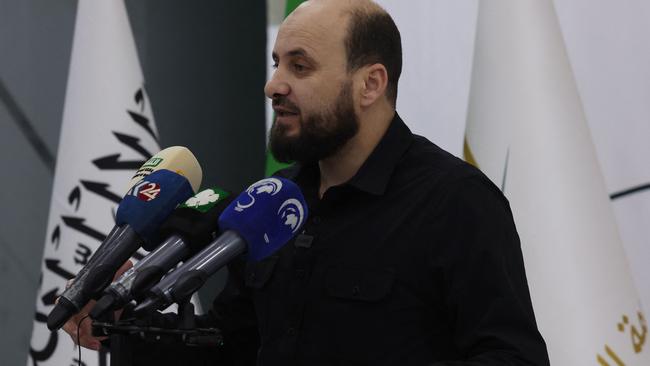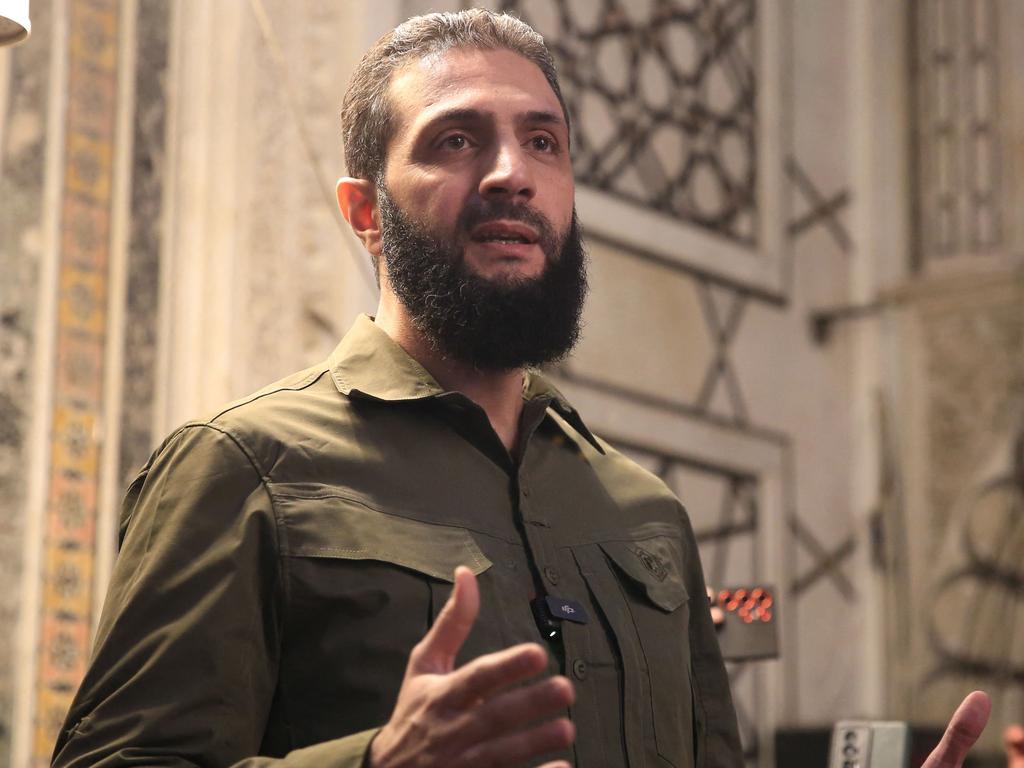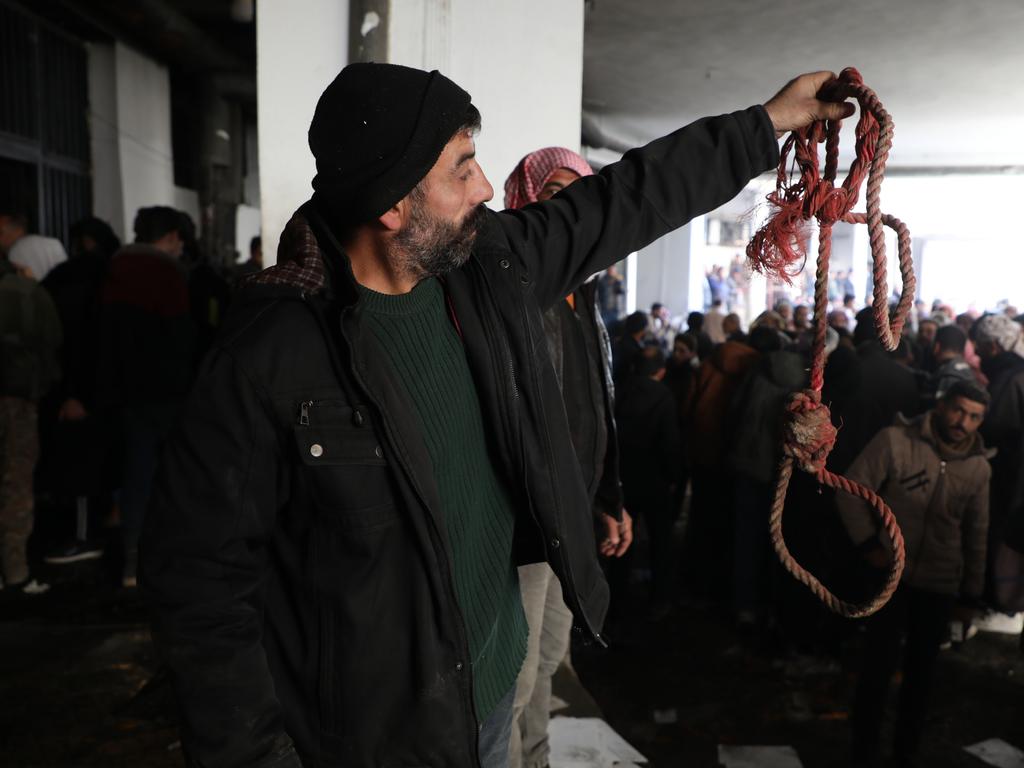No more war vows Syrian rebel leader Abu Mohammed al-Jolani as new PM is named
Abu Mohammed al-Jolani tells Sky News Syria is ‘exhausted’ by years of conflict as Mohammed al-Bashir, head of a de facto government in the rebel-held northwest is named transitional PM.

Syrian rebel leader Abu Mohammed al-Jolani has vowed the country will not face another war, telling Sky News that its citizens were already “exhausted” by years of conflict.
“People are exhausted from war. So the country isn’t ready for another one and it’s not going to get into another one,” Mr Jolani, now calling himself by his birth name Ahmed al-Sharaa, said in Damascus on Wednesday (AEDT).
Mr Jolani’s organisation Hayat Tahrir al-Sham says it had nearly completed the task of securing the capital and has tapped Mohammed al-Bashir, the head of a de facto government the group backed for years in Syria’s rebel-held northwest, to form a transitional government for the entire country.
Mr Bashir met with Mr Jolani as well as the prime minister of the ousted regime, who for now is working with the group on a transition. On Tuesday, the Syrian state news agency said Mr Bashir was taking over as interim prime minister until March 1. What happens next isn’t clear, though some opposition figures are pushing for elections.
Restoring order
When the regime of Bashar al-Assad collapsed over the weekend without a fight, Damascus slipped into a power vacuum that saw the pillaging of the deposed president’s ornate palace, some government buildings and the homes of high-ranking officials.
But hours after Assad fled Syria, organised rebel forces entered the capital and began attempting to restore order. Gunmen from HTS, one of the largest groups from the north, curbed looting and set up checkpoints to confiscate stolen goods, including furniture, electronics and home appliances, residents said.
The rebel group of just 25,000 fighters, in collaboration with other insurgent forces, shocked the world with a lightning assault that in just over a week toppled the Assad regime, which had ruled Syria for more than half a century. The country, made up of diverse ethnic and religious communities, has become an unwieldy patchwork of armed groups that could potentially turn on each other now that the central authority is gone.
Mr Jolani has become the most visible face of the new power in Damascus, praying at the historic Umayyad Mosque on Sunday and addressing supporters there. “The future is ours,” he said. Syrian analysts say HTS is joining forces with local entities and expect it will be a few weeks before the transition process becomes clearer.
Mr Jolani fought the U.S. occupation in Iraq, where he ended up in an American-run prison. He later joined Islamic State and then al Qaeda but broke with both groups and steered HTS away from the global jihadist movement waging war on the West. Since 2017, HTS has administered a statelet in northwest Syria with a population of some four million people.
HTS is classified by many foreign governments, including the U.S., as a terrorist organisation over links to al Qaeda, which it disavowed years ago. Its dominant role in Syria’s transition now presents a conundrum for those governments. A U.K. minister said the British government would consider delisting the group depending on its behaviour in the coming period.
The incoming Trump administration might not be as flexible. Joel Rayburn, a former senior director for Syria on the National Security Council who is working on the president-elect’s national security transition team, said Jawlani and HTS are “delusional” if they think the world would support a transitional government that he said circumvents the United Nations.
The extent of HTS control varies across the country. In northwestern areas around Idlib, where it was holed up for years under bombardment from the regime and its Russian ally, it established a government that focused on delivering needed services and showed some tolerance for Christians and women, drawing criticism from hardliners.
When it took Aleppo late last month, it quickly imposed itself. But in Damascus, it was less disciplined rebel groups from the suburbs and southern areas like Deraa that first entered the city.
Moataz Houssein, a Damascus resident, described a capital city haunted by decades of suffering and the rapid developments of recent days, with most shops still closed and many people staying home out of fear. He said he encountered gunmen firing celebratory gunshots and recently released prisoners wandering the streets as Israeli air strikes echoed in the distance.
“It all feels like a nightmare, yet you remind yourself it is also a dream – now that Assad is gone,” he said.
Several officials in Damascus have been focused on finding fuel for buses to get employees to work, fixing power outages and hiring workers to clean neighbourhoods. In some parts of the country, schools that closed last week partially reopened Tuesday. Stores and restaurants in the capital began opening but many remained closed due to a lack of supplies. The price of basic goods has soared, and the Syrian pound weakened.
Haid Haid, a fellow at Chatham House who is from Syria, said HTS has historically been successful by pursuing a gradual approach to governance that mixes coercion with patience and persuasion, which allows it to implement its objectives slowly and avoid backlash by adapting to public reactions.
“Its mixed strategy helps mitigate negative consequences and avoid alienating local communities, whose support is vital for its survival and influence,” he wrote on X. But with the regime’s collapse and the rebels’ rapid territorial gains, it may have to pursue meaningful reforms or risk losing favour among many Syrians.
Seeking to break from the brutal 54-year rule of the Assad family while preventing chaos and maintaining the continuity of state institutions, the rebels have sought to reassure Syria’s minorities that they will be safe. It has kept some of the regime’s ministers and managers in place, at least for now, in addition to bringing in some new ones.
They said Monday that personal freedoms and individual rights would be guaranteed, ruling out restrictions on women’s clothing in the name of modesty like those that exist in Iran and Afghanistan.
The rebels have introduced a general amnesty for conscripts in Syria’s former army, ordered former officials to identify themselves to the new authorities in exchange for safe treatment, and asked police to stay on duty. Video published by Iran’s Al-Alam Arabic state TV channel showed calm at Seyda Zeinab, a revered Shiite shrine south of Damascus, discrediting reports that it had been attacked.
The rebels have pledged to hold officials from the dictatorial Assad regime accountable for alleged torture and war crimes amid fears of lawlessness and score-settling.
Sawsan Abou Zainedin, chief executive of Madaniya, an umbrella group of more than 200 Syrian civil-society organisations working inside the country and in diaspora, said the same people who have been running state institutions should maintain their roles, with support from experts and technocrats who had been marginalised by the previous regime.
“We are not in the business of de-Baathification whatsoever here,” she said, referring to the policy during the U.S. occupation of Iraq of disbanding the ruling party, a move that was widely blamed for fuelling the insurgency there.
Dow Jones, AFP






To join the conversation, please log in. Don't have an account? Register
Join the conversation, you are commenting as Logout